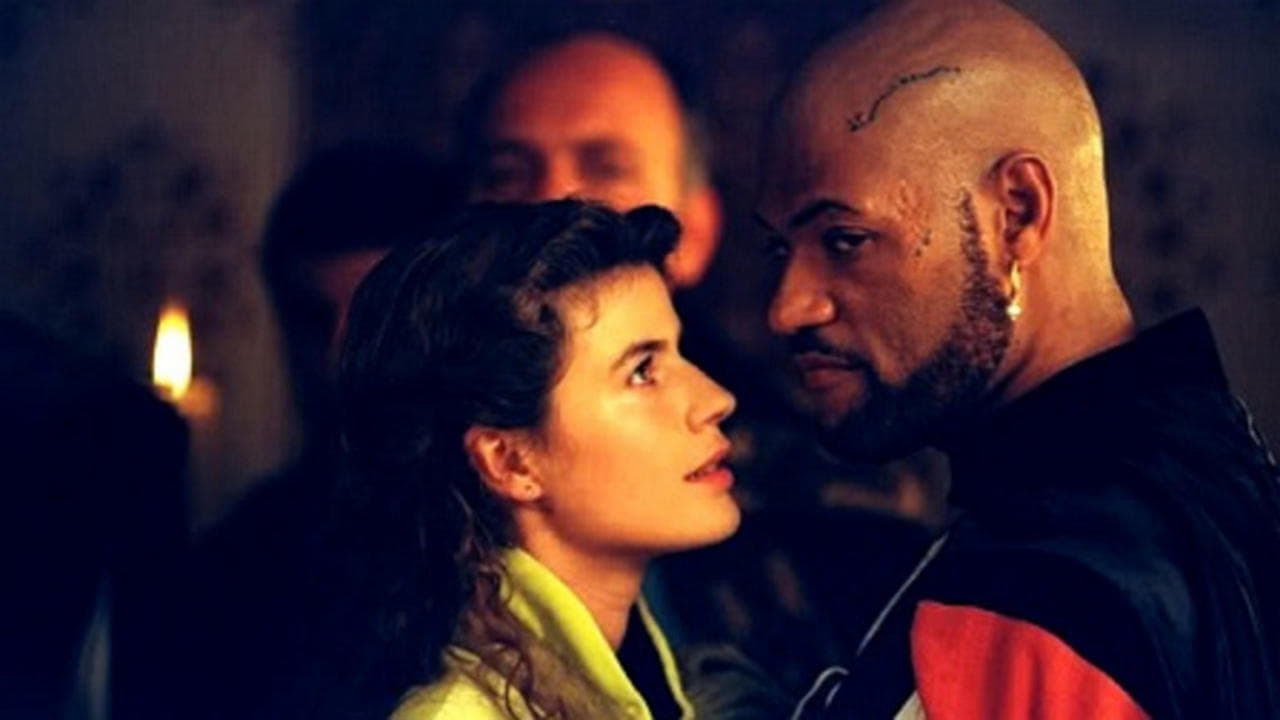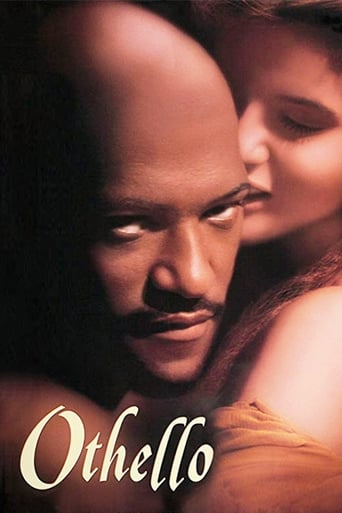

... or was Honest Iago actually smirking at the end, as he died?Loved how the Bard's iambic pentameter just rolled of Fishburne's tongue, with excellent clarity and emotion.And how Branagh made Honest Iago seem to celebrate his own evilness...This is a wonderful film.I have often thought that Shakespeare is inherently not film-friendly: He uses words to create pictures in our minds, which creates a perennial battle with the camera, which only knows to show us what we need to think and feel. Every effort to film Shakespeare ought really to be celebrated. It is not an easy thing to do.
... View MoreStudents often ask me why I choose this version of Othello. Shakespeare's text is strongly truncated and the film contains material which earned it an "R" rating.I have several reasons for using this production: First, I had not seen a depiction of the Moor that actually made me sympathetic to Othello until I saw Fishburne play him. I saw James Earl Jones and Christopher Plummer play Othello and Iago on Broadway, and it was wonderful. Plummer's energy was especially noticeable. But in spite of Jone's incredible presence both physically and vocally, the character he played just seemed too passive to illicit from me a complete emotional purgation in the Aristotelian sense. Jones, in fact, affirmed what I felt when in an interview he noted that he had played Othello as passive--seeing Iago as basically doing him over. Unfortunately this sapped my grief for the character destruction. Thus, I felt sympathy for Jone's Moor but not the horror over his corruption by an evil man. In contrast, Fishburne's Othello is a strong and vigorous figure familiar with taking action. Thus, Iago's temptation to actively deal with what is presented to Othello as his wife's unfaithfulness is a perversion of the general's positive quality to be active not passive.1 The horror of the story is that this good quality in Othello becomes perverted. Fishburne's depiction is therefore classically tragic.Second, Fishburne is the first black actor to play Othello in a film. Both Orsen Wells and Anthony Hopkins did fine film versions, but they were white men in black face.2 Why is this important? Why should a Black actor be the Black man on the stage?3 Certainly in Shakespeare's day they used black face just as they used boys to make girls. Perhaps then, the reason is the same. Female actors bring a special quality to female roles on the Shakespearian stage because they understand best what Shakespeare's genius was trying to present. A gifted black actor should play the moor because his experience in a white dominated culture is vital to understanding what Shakespeare's genius recognized: the pain of being marginalized because of race. An important theme in Othello is isolation caused by racism. Although it is a mistake to insert American racism into a Shakespearian play, there can be little doubt that racism is still working among the characters. Many, including Desdimona's father, think that a union between a Venetian white Christian woman and a North African black Christian man is UNNATURAL.Third, Shakespeare was never G rated. He never has been. His stage productions were always typified by violence and strong language. But Shakespeare's genius uses these elements not as sensationialism but for artistic honesty.
... View MoreAs my Shakespeare Professor had mentioned, the part of Othello is highly challenging, which is why many don't perfect it or intend to play it. Larry Fishburne however did a magnificent job! He provided us an astonishing portrayal of how even a noble, righteous and even intelligent man, can succumb to "the green eyed monster." The calculatingly evil Iago was FLAWLESSLY portrayed by veteran Shakespearian actor Kenneth Branagh, who occasionally stared into the eyes of the camera itself, explaining his dark plans and expectations.
... View MoreYou do not get more dark or tragic than "Othello" and this movie captures the play fairly well, with outstanding performances by Lawrence Fishburne and Irene Jacob. Fishburne's expresses to the viewer Othello's torment as he falls prey to Iago's lies very convincingly, even providing a realistic epileptic episode. Jacob is the loving and loyal wife who becomes either the instrument of Iago's revenge against Othello, or the object of his wrath (it is not clear which since no motive for Iago's behavior is offered). Although Kenneth Brannagh (sp?) displays his usual talent for Shakespeare in this movie, he is somewhat marginalized. The characters of Cassio and Emilia also wander in and out of scenes even though they, like Iago, seem more crucial to the plot. I have not checked the movie against the play to see how many lines were cut out, but I know that Shakespeare tends to develop his characters, even the seemingly unimportant ones, very well.If I had any criticism of the movie it would be that the story unfolds too quickly, and that the relationships between some of the characters are not laid out more. The director had a great cast, and no one offered a bad performance. The relationship between Cassio and Othello and that between Emilia and Desdemona need to be further developed earlier in the film. I have a feeling that they were closer to each other than the movie suggests, although you get a sense of this very late into the movie. Also, Othello and Desdemona need more time together. Although their anguish is convincing, the amount of interaction they have with each other makes it seem like they just met. On the other hand, maybe the did just meet---like Romeo and Juliet.In brief: good performances, too short.
... View More